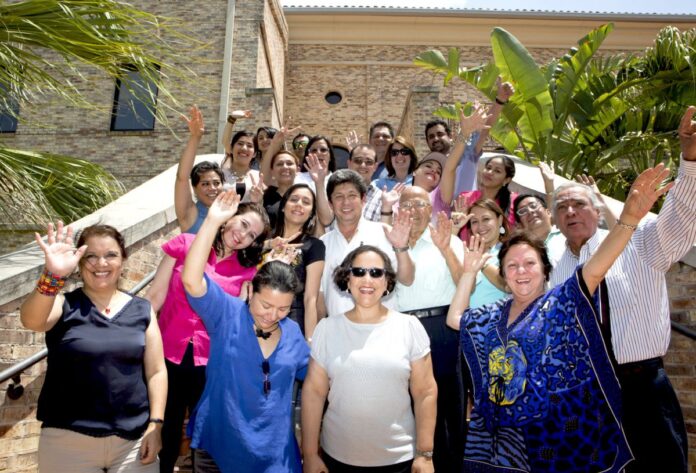BY Cheryl Taylor
Professors and graduate students from seven Latin American countries are visiting South Texas for the first time to attend a multi-disciplinary research symposium hosted by The University of Texas Rio Grande Valley through July 9.
A collaborative effort among UTRGV, La Universidad de Puerto Rico and the Asociación Latino Americana de Facultades de Contaduría y Administración (ALAFEC), the symposium topic is “Quantitative research skills to explore bio-ethical reasoning with an alignment towards sustainable development, fair trade and responsible consumption.”
Dr. Havidán Rodriguez, UTRGV provost and executive vice president for Academic Affairs, welcomed the group at the opening reception June 26 at El Gran Salón on the Brownsville Campus.
“ALAFEC is a highly regarded, 50-year-old association,” Rodriguez said. “We are honored that UTRGV was selected to host this year’s symposium – the first time that a U.S. university has been selected as host. UTRGV wants to increase its global presence, visibility and impact. This initiative is certainly an important step in the right direction.”
ALAFEC began promoting the interchange of research projects in 2006 and conducts annual symposiums rotating between different countries each year. UTRGV’s selection was largely through the efforts of Dr. Edith Galy, associate professor in the College of Business and Entrepreneurship.
Galy’s co-coordinators, both from the University of Puerto Rico, are Dr. Silvia López Palau, professor of accounting and international business, and Dr. Beatriz Rivera Cruz, professor of finance and economics.
“The program is designed for participants to experience a high-level academic experience exploring bioethical reasoning,” Galy said. “Participants are using quantitative methodologies as they collaborate on their ongoing research on sustainability, bioethics and responsible consumerism.”
Hailing from Colombia, Costa Rica, El Salvador, Ecuador, Mexico, Paraguay and Peru, the participants began their research projects at their home universities. They connected with one another via the Blackboard online teaching site managed by UTRGV’s Center for Online Learning and Teaching Technology.
Dr. Gustavo Canatta Piris, professor of economics at La Universidad Nacional de Asunción, Paraguay, said the advance work on the symposium before leaving home was helpful.
“We appreciate using this technology to collaborate in preparation of being together here at UTRGV. It gave us a good jump start and allows for more efficient use of our time,” he said.
Galy said the peer feedback and evaluation taking place over the two-week symposium will result in the publication of multiple articles in academic journals.
Dr. Francisco Guajardo, executive director of the UTRGV B3 Institute, said collaborations such as this one are just the beginning of opportunities for students and professors.
“The ALAFEC course at UTRGV is an example of instruction being conducted in Spanish at UTRGV, and serves as an instructional and pedagogical practice that UTRGV encourages, as it transforms itself into a bilingual, bicultural, and bi-literate university,” he said.




